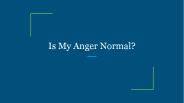Online Trauma Therapist In Doral PowerPoint PPT Presentations
All Time
Recommended
First appearing in 1980 in the third edition of the Diagnostic and Statistical Manual of Mental Disorders (DSM-III) published by the American Psychiatric Association, post-traumatic stress disorder (PTSD) is suffered by individuals who have experienced severe trauma in their lives. While the nature of the trauma can vary, PTSD is perhaps best known for its association with service men and women returning from conflict, and many are unaware (or unaccepting) of the fact that just about anyone who has been through a traumatic event, can suffer from this mental health condition.
| PowerPoint PPT presentation | free to download
Panic attacks are a common occurrence for many, and involve the individual experiencing a sudden and intense episode of fear with no real cause. In many cases, they can trigger serious physical reactions, such as chest pains, dizziness and nausea. Often happening without warning, the Anxiety and Depression Association of America estimate that as many as 6 million people suffer from panic attacks, with women twice as likely to experience them. For some, self-care steps can help them manage the frequency and intensity of their attacks, while for others, professional help is needed.
| PowerPoint PPT presentation | free to download
Stress, when managed correctly, is a normal part of many of our lives, but for those who struggle to process and manage it properly, it can quickly become negative and harmful.
| PowerPoint PPT presentation | free to download
When you experience the loss of a loved one, the support of family and friends can help you manage your grief, and even though you might benefit from seeking therapy, you may not choose to do so. Believing that the grieving process is typically a long one, and that it’s normal to experience grief for a prolonged period after a loss, is often the reason why many people don’t seek therapy for their bereavement. However, if you’re struggling to move on through the grieving process, and are finding that your sense of loss has become overwhelming despite support from friends and family, counseling can almost certainly help you, and here’s why:
| PowerPoint PPT presentation | free to download
If you’re a new mum, you might be wondering why you’re not feeling overjoyed and thankful for the tiny new life you’ve recently been gifted with. Instead, you’re feeling exhausted, down, sad, and filled with intense guilt about your parenting skills, or lack of.
| PowerPoint PPT presentation | free to download
When you experience the loss of a loved one, the support of family and friends can help you manage your grief, and even though you might benefit from seeking therapy, you may not choose to do so. Believing that the grieving process is typically a long one, and that it’s normal to experience grief for a prolonged period after a loss, is often the reason why many people don’t seek therapy for their bereavement. However, if you’re struggling to move on through the grieving process, and are finding that your sense of loss has become overwhelming despite support from friends and family, counseling can almost certainly help you, and here’s why:
| PowerPoint PPT presentation | free to download
While anger is a perfectly normal emotion, many of us tend to associate it with frustrated teenagers struggling with their hormones, and fail to recognize the symptoms and triggers, or know when to seek help in dealing with a possible anger disorder.
| PowerPoint PPT presentation | free to download
In a report recently published in The Lancet, a study of COVID-19 patients in the UK found that they were almost twice as likely to develop a psychiatric disorder after recovering from the virus, than people who hadn’t had it. From depression, anxiety, or dementia, 18% of those who took part in the study were found to develop mental health issues within just 3 months of their diagnosis.
| PowerPoint PPT presentation | free to download








